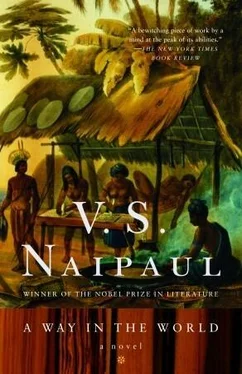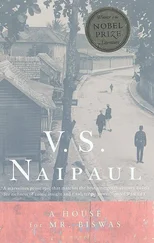At night the water is more turbulent than at sunrise, and the weak lights of the rocking Destiny , lying within the Gulf, and its sentinel ship, lying south of The Soldier, can be seen from far.
In the middle of the day the sky is blue, the birds circle above The Soldier, mere glitter replaces the colours of the choppy water and blurs far-off objects.
So the small vessel, coming up one afternoon from the eastern channel, bobbing up and down, appears and disappears in the glitter. A canoe? Indian canoes steer clear of the Destiny now. This vessel comes steadily on. The sentinel ship signals. The vessel coming up is one of the expedition’s launches. The captain of the Destiny fixes his glass on the approaching shape, its outlines dissolving and re-forming in the white glitter. The deck of the ship is hot below the thin leather soles of the soldiers, watchful now, sweating in their hot breast armour.
In the captain’s glass a launch defines itself at last. Not an Indian canoe. An English launch: its sails can be seen: the oars of the rowers are at rest. Some armed soldiers are with them. And a gentleman, a man in splendid clothes, sitting on one of the benches. Not English clothes. Spanish clothes.
It can only be the Spanish governor. Is he a captive? Has some act of war therefore occurred? Or is he coming to parley, to offer a deal, nobleman to nobleman?
In the general’s cabin, hot in the afternoon, with the smell of the sea and the estuary mingling with the smell of sickness, and the small bleached curtains glowing in the light, the old man bestirs himself and begins to dress, to receive the governor. The surgeon helps him. A clean shirt for the general: it smells of the brackish water in which it has been washed. Then the two men go out together to the light on the deck.
The launch gets nearer.
“Is it Palomeque?” the old man asks.
“It’s an Indian,” the surgeon says. “They’ve dressed him up in Spanish clothes. The governor’s, or some other nobleman’s. The clothes are far too big for him.”
The old man falls silent. The sails slacken, the launch pulls alongside. The Indian looks up, all face in the too-big clothes. A soldier from the launch climbs half-way up the ship’s ladder. A second soldier passes him things from the launch.
The man on the ladder says, “For the admiral. Captain Keymis’s compliments. A basket of oranges and lemons.” He passes the fruit, already shrivelling, to a musketeer on the deck. “A roll of tobacco. A parcel of papers.”
The surgeon takes the papers and glances at them. He says, “Spanish papers.”
“A tortoise,” the man on the ladder says, as that creature, its shell warm from the sun, its lower part cool from the bilge water where it’s been resting, is passed up. “And Don José himself.”
This is the Indian. He is pushed up the ladder. The clothes are the clothes of a man a foot taller, and they are not as fine as they appeared from a distance. They are flecked with mud and stained in places with old blood and bilge water; sweat stains under the arms show purple on the blue silk. The Indian is uncertain. He fixes frightened eyes on the old man with the white beard.
WE STAY with those Indian eyes. When we next consider them they are calmer, even self-possessed. Let us stand back a step or two. We see then that the possessor of those eyes is now wearing English Jacobean clothes that fit. He is sitting at a heavy dark table in a high, bare room. It is cool in the room, though it is sunny outside. The solid walls are unevenly plastered and the sloping projections catch the dust here and there.
A year has passed. In spite of Don José’s English clothes, we are in New Granada, back in the New World and South America, and Don José is giving evidence to a priest, Fray Simón, who is writing a history of the Spanish New World.
Fray Simón is reading back from his notes.
“ ‘And witness says that after these gifts were handed over, the surgeon asked for news. A letter was handed over to the general. And when the letter was half read, the general, whose name at that time witness thought to be Milor Guaterai, looked at the deck and the sea and the sky, and then at the birds flying above the rock known as The Soldier, and then he looked at the deck again and began to cry silently, in the presence of all, for the death of his son.’ And so?”
Don José says, “The surgeon came forward to support the old man, and the old man allowed himself to be held.”
EYES ALONE now, we will go down the fast-flowing channel from the Gulf to the main river. The water and the banks are all that we will see. We are travelling at the speed of the ships, and we are seeing (without interference, with the help of this camera’s eye) the once aboriginal waters down which Captain Keymis’s four ships passed a full year before, with four hundred heavily armed men, among them a section of pike commanded by the old man’s son. Big forest birds fly ahead. The white sky yellows, then glows red; the muddy water turns violet in the fading light. Night falls on the river and the banks; the bush begins to sing. We slow down. The expedition has drawn near to the Spanish settlement.
Here we begin to fit pictures to the words of Don José. The narrative is now his.
“When the people of San Thomé heard that the English were coming they were frightened. When they heard that all those ships had anchored outside the river they began to take away their goods from their rancherías to the island in the middle of the river.”
“Rancherías?” Fray Simón said. “Shacks, huts? Do you mean that? Were they living in huts?”
“Only the governor lived in a house, and everything was in that house. The jail, the Royal Treasury, everything. The Treasury was full of people’s goods. The governor, Don Palmita, was a very hard man.”
“Palomeque. Pa-lo-me-que.”
“The governor took people’s goods when they broke the law. The people didn’t have money to pay the fines. Don Palomeque didn’t like people trading with the foreigners.”
“Don Diego. Don Diego Palomeque.”
“Don Diego said this kind of trading was against the king’s laws, and he was determined to put an end to it. So he took people’s goods. He was no respecter of persons. In the Treasury in his house in San Thomé there was a lot of silver plate belonging to the wife of the previous governor. I mention this because I used to work for the family. In fact, the previous governor was my father. Don Fernando Berrio. You can look at my face and see that I am Spanish.”
Fray Simón said, “Not especially.”
“I am just telling you what people say. My mother was an Indian woman, of course. People didn’t like this new gov ernor, Don Diego, and if he didn’t have those soldiers from Puerto Rico with him, they would have killed him in Trinidad or San Thomé. He was coming and going between the two places and, even with the soldiers, there were many places on the river where he could have had an accident. I am not giving away any secrets if I say that some people were happy to hear that the English were coming. One Indian servant actually said so in Don Diego’s hearing. The governor had the foolish man whipped in the open ground we called the plaza and then had him chained up in the jail in the governor’s house. This happened about four days before the English came.
“The next day news was brought of the size of the English force. People said four hundred men, five hundred, seven hundred men were coming. At nightfall all the vecinos or people of the little town left their rancherías and took all the food they had and went to the island in the river. My people did that too. They left me behind just in case something happened when the English came and I was in a position to recover the silver plate from the governor’s house. The next evening, or the evening after that, the soldiers from Puerto Rico deserted. There were about fifty of them. More than enough to frighten the vecinos of San Thomé, but not enough to face the English. They went to the island where the townspeople had gone.
Читать дальше












